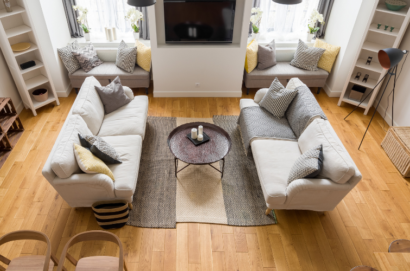What Are The Top Benefits Of Vinyl Flooring?
Vinyl flooring has emerged as a popular choice for homeowners and designers alike due to its versatility, durability, and aesthetic appeal.
Originating from the mid-20th century, vinyl flooring has undergone significant advancements, making it a practical and stylish option for various spaces.
Let’s delve into its origins, composition, advantages, disadvantages, popular colors, and frequently asked questions (FAQs) to understand why vinyl flooring is a top choice for many.
What Are The Top 10 Benefits Of Vinyl Flooring?
1. Durability: Vinyl flooring is highly resistant to scratches, stains, and wear, making it ideal for high-traffic areas in homes and commercial settings.
2. Water Resistance: Unlike hardwood or laminate flooring, vinyl is waterproof, making it suitable for areas prone to moisture, such as kitchens, bathrooms, and basements.
3. Easy Maintenance: Vinyl flooring is incredibly easy to clean and maintain. Regular sweeping and occasional mopping are typically all that’s needed to keep it looking pristine.
4. Affordability: Vinyl flooring is often more budget-friendly compared to materials like hardwood or ceramic tile, offering cost-effective options without compromising on quality or style.
5. Versatility: Available in a wide range of colors, patterns, and textures, vinyl flooring can mimic the look of natural materials like wood, stone, or tile, allowing for endless design possibilities.
6. Comfort Underfoot: Vinyl flooring offers a soft and cushioned feel underfoot, providing comfort for long periods of standing or walking.
7. Noise Reduction: Vinyl flooring can help reduce noise transmission, making it a quieter option compared to hard surface flooring materials like tile or hardwood.
8. Installation Options: Vinyl flooring is available in various installation methods, including glue-down, click-lock, and peel-and-stick, making it suitable for both professional installation and DIY projects.
9. Health and Safety: Many vinyl flooring products are certified low-VOC (volatile organic compound), contributing to better indoor air quality and a healthier living environment.
10. Longevity: With proper care and maintenance, vinyl flooring can last for many years, providing a durable and attractive flooring solution for residential and commercial spaces alike.

Vinyl Flooring Origins and Composition
Vinyl flooring is essentially a product composed of several layers of different materials sandwiched together to form a highly durable, practical and affordable floor covering.
There are two main types of vinyl flooring: Luxury Vinyl Tiles (LVT) and vinyl roll.
Both LVT and vinyl roll are made from the same materials, but, they’re built differently to produce different effects. For instance, the plank format is ideal to imitate natural wood.
Vinyl flooring is primarily composed of polyvinyl chloride (PVC) resins, plasticizers, stabilizers, and sometimes additives like pigments or fillers.
These materials are combined through a manufacturing process to create sheets, tiles, or planks of vinyl flooring.
The manufacturing process typically involves the following steps:
Preparation of Raw Materials: PVC resin, plasticizers, stabilizers, and other additives are carefully measured and mixed according to specific formulations to achieve desired properties such as flexibility, durability, and color.
Mixing and Compounding: The raw materials are mixed together in a compounding machine to form a homogenous mixture. This process may involve heating and blending to ensure uniform distribution of ingredients.
Calendering or Extrusion: The compounded mixture is then processed through calendering rollers or extruders to create sheets or rolls of vinyl flooring material. Calendering involves passing the mixture between heated rollers to form thin sheets, while extrusion involves forcing the mixture through a die to create specific shapes like tiles or planks.
Embossing and Surface Treatment: Depending on the desired texture and appearance, the vinyl flooring may undergo embossing to create realistic wood grain or tile patterns. Surface treatments such as coating with wear layers or UV-cured finishes may also be applied to enhance durability and resistance to scratches, stains, and fading.
Cutting and Sizing: The vinyl flooring material is cut into desired sizes and shapes, such as tiles or planks, using cutting machines or dies.
Packaging and Distribution: The finished vinyl flooring products are packaged and prepared for distribution to retailers, contractors, or consumers.
What Are The Top 5 Advantages Of Vinyl Flooring?
- Durability: Vinyl flooring is highly resistant to scratches, stains, and moisture, making it ideal for high-traffic areas like kitchens and bathrooms.
- Easy Maintenance: It requires minimal upkeep, needing only regular sweeping and occasional mopping to keep it looking new.
- Affordability: Vinyl flooring is more budget-friendly compared to materials like hardwood or stone, offering a cost-effective solution without compromising on quality.
- Versatility: Available in a wide range of colors, patterns, and textures, vinyl flooring can mimic the look of natural materials like wood or tile, offering endless design possibilities.
- Comfort: Vinyl flooring has a soft underfoot feel, providing comfort and insulation against cold floors.
What Are The Top 5 Disadvantages Of Vinyl Flooring?
- Vulnerability to Sharp Objects: While vinyl flooring is durable, sharp objects like heavy furniture or high heels can cause damage if not handled carefully.
- Not Environmentally Friendly: Some vinyl flooring products may contain harmful chemicals, and disposal can pose environmental concerns.
- Susceptibility to Fading: Direct sunlight exposure over time can cause certain types of vinyl flooring to fade or discolor.
- Limited Repair Options: Unlike hardwood or tile, damaged vinyl flooring may be challenging to repair, often requiring replacement of the affected area.
- Potential for Indentations: Heavy furniture or appliances left in place for extended periods may cause indentations in vinyl flooring.
FAQs
- Is vinyl flooring waterproof?
- While vinyl flooring is water-resistant, not all types are entirely waterproof. Some luxury vinyl products offer enhanced waterproof properties.
- Can vinyl flooring be installed over existing floors?
- Yes, vinyl flooring can often be installed over existing floors, provided the surface is smooth, clean, and level.
- How long does vinyl flooring typically last?
- With proper care and maintenance, vinyl flooring can last anywhere from 10 to 20 years or more.
- Is vinyl flooring suitable for pets?
- Yes, vinyl flooring is pet-friendly, as it resists scratches and stains. However, it’s essential to keep pet nails trimmed to prevent damage.
- Can vinyl flooring be installed in bathrooms?
- Yes, vinyl flooring is an excellent choice for bathrooms due to its moisture resistance and easy maintenance.
- Is vinyl flooring suitable for DIY installation?
- Yes, many types of vinyl flooring are designed for easy installation, making them suitable for DIY enthusiasts.
- Does vinyl flooring emit harmful chemicals?
- While some vinyl flooring products may contain volatile organic compounds (VOCs), many manufacturers offer low-VOC or VOC-free options.
- Can vinyl flooring be recycled?
- Some types of vinyl flooring are recyclable, but recycling options may vary depending on the product and location.
- Does vinyl flooring fade in sunlight?
- Certain types of vinyl flooring may be susceptible to fading when exposed to direct sunlight for extended periods. Choosing fade-resistant products can help mitigate this issue.
- Is underlayment necessary for vinyl flooring installation?
- While not always required, underlayment can help improve the comfort, sound absorption, and durability of vinyl flooring, especially in areas with uneven subfloors.
If you have any questions about our article, “What Are The Top Benefits Of Vinyl Flooring? Our Flooring Contractors Have Answers” or need vinyl flooring and vinyl flooring installation services contact sales@generalflooringcanada.ca or chat with us on LiveChat or social media.




